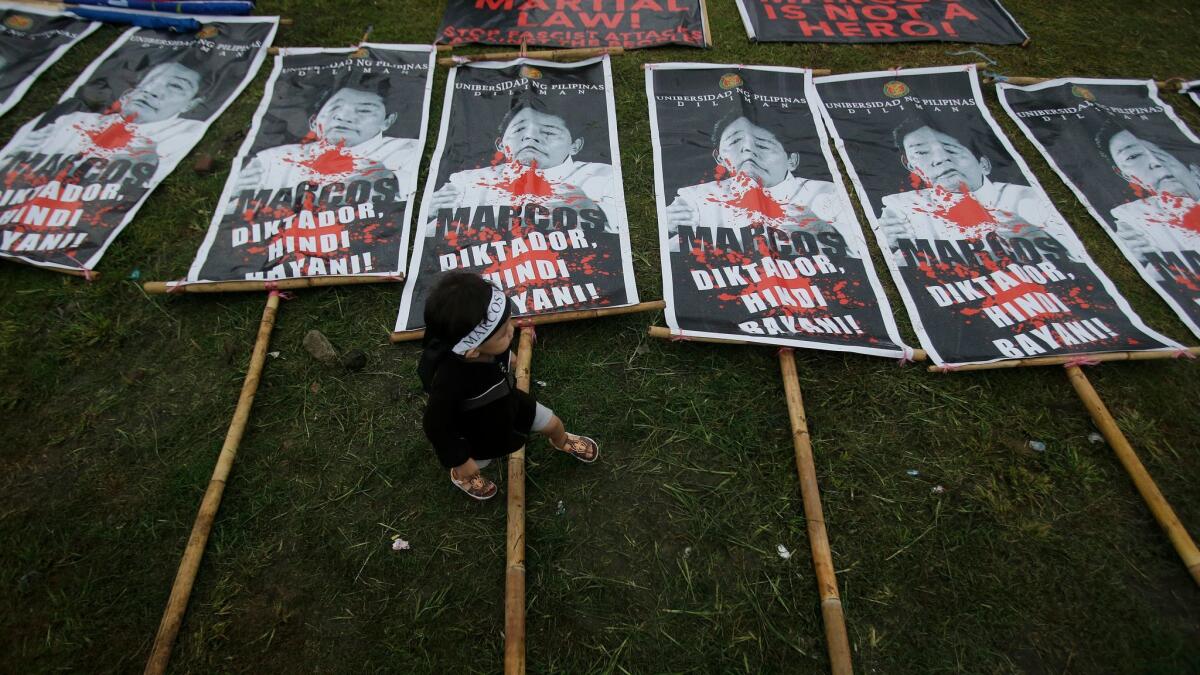Duterte’s presidency revives the threat of martial law in the Philippines

- Share via
Reporting from Beijing — In late 1973, one year after Philippine dictator Ferdinand Marcos declared martial law, Amado Picardal distributed pamphlets at his university decrying the “death of democracy.” Marcos’ security agents responded by brutally interrogating the 18-year-old student — kicking him in the solar plexus and kidneys, until he passed out — and detaining him for seven months.
The Philippines cast off martial law in 1981 — and five years later, Marcos was ousted by massive, pro-democracy protests. But now, the current president, Rodrigo Duterte, is publicly flirting with bringing it back — and Picardal, now an activist and priest in the city of Baclaran, near Manila, is taking the threat seriously.
Duterte is “more dangerous than Marcos,” Picardal said. “I don’t think he has any conscience. No sense of remorse.”
Duterte was inaugurated June 30, and his early tenure has been marked by profanity and endorsements of violence. He has acted on campaign promises to rid the country of illegal drugs without regard for due process, triggering a wave of extrajudicial killings, both by police and vigilantes. More than 3,000 people have died. When Western officials called for the killings to stop, Duterte delivered profanity-laced tirades against the U.S., United Nations and European Union.
He has also raised the specter of martial law as a threat to critics who might thwart his initiatives.
Experts say that because Duterte understands the law — he was once a prosecutor — and the risk of provoking a public outcry, he likely won’t declare martial law as long as his approval ratings remain high. (He said this month that he was “not a fan” of martial law, calling it a “contingency to meet widespread violence.”) Yet he might not rule it out if his opposition grows stronger.
“The administration is still very popular and secure in its position,” said Richard Javad Heydarian, a professor at De La Salle University in Manila. “So I doubt they, so far, feel the need to go extraconstitutional.”
On Nov. 12, Duterte said that he “might be forced to” suspend the writ of habeas corpus — which grants detainees the right to challenge the legality of their detention — to rein in “lawlessness” on the southern island Mindanao. Suspending the writ is widely considered a precursor to declaring martial law.
“I’m just warning them,” he said. “I don’t want to do it because it’s not good … but I will do it because I have no remedy for it.”
In early September, Duterte put the country “under state of lawless violence” after a bombing in Davao, Mindanao’s biggest city, killed 14 people, granting the military special powers to aid in police operations. Afterward, a close associate, Executive Secretary Salvador Medialdea, told local media that Duterte “was mulling the idea” of declaring martial law, but ultimately decided that it was “not necessary.”
In August, Duterte threatened to declare martial law if the Philippines’ judiciary blocked his drug war. “Please do not create a confrontation, a constitutional war. We will all lose,” he said.
Under the Philippines’ 1987 Constitution — which the country adopted after Marcos’ ouster, to return the country to democratic rule — the president may not suspend the writ of habeas corpus “except in cases of invasion or rebellion when the public safety requires it.”
Although Duterte’s popularity remains high, recent controversies have revealed its potential pressure points.
In October, Duterte pledged to deepen economic and military ties with Beijing, eliciting polarized reactions in the country. Most Filipinos distrust China and hold an overwhelmingly positive view toward the U.S., in part because of a years-long conflict between Manila and Beijing over vast swaths of disputed territory in the South China Sea.
He has also approved, to great controversy, the interment of Marcos’ remains at the National Heroes’ Cemetery in Metro Manila. On Nov. 18, helicopters lifted the dictator’s remains from a mausoleum in his home province of Ilocos Norte to the cemetery, where he was buried in a closed ceremony. Thousands of people have protested the burial nationwide.
Former Philippine President Fidel Ramos called the burial a “step backwards” for Duterte’s administration, “in the sense that they are losing support, they are losing friends.”
“For those who are concerned about martial law — and we still have plenty of them — these signals are not very comforting,” said a Manila-based human rights activist who requested anonymity, citing fear for his personal safety. “And I think that’s part of the reason why the burial of Marcos generated a lot of backlash.
“The thing to keep in mind is that there’s nothing right now that [Duterte] cannot do,” the activist said, adding that the president has strong support in other branches of government. “He’s pretty much given a blank check to do whatever he wants.”
ALSO
Meet the Nightcrawlers of Manila: A night on the front lines of the Philippines’ war on drugs
Philippine President Duterte: ‘I announce my separation from the United States’
More to Read
Sign up for Essential California
The most important California stories and recommendations in your inbox every morning.
You may occasionally receive promotional content from the Los Angeles Times.










